A question I hear frequently these days is, "Why did you choose Nice for retirement?” I hear it from residents of Nice most frequently (who probably can already guess some of the answers), but from others as well—including some Substack readers.
There are many reasons why we chose to move from Dublin, Ireland to Nice, France when retiring at the end of 2021. It was partly from familiarity—we had made several trips to Nice and enjoyed two Christmas holidays there as a family. We appreciated the mild December weather (and the reprieve from Dublin’s often damp, grey winters) and simply being there. But choosing a place to live is different from just choosing a holiday destination, and we took the process seriously. At this stage of life, we really don’t want to have any more major moves.
(I should mention that, as Americans who are also Irish citizens with status in the Irish social welfare system, moving to France did not pose some of the constraints as it would for someone who is not a citizen of an EU country).
When plotting our retirement, we identified a long list of essential and desirable attributes for a new place to live. Access to quality and affordable healthcare is what led us to live in Europe back in 2009, and it remained a priority. It was on that basis that we chose France as our country of destination. But our wish-list was long. Among our priorities as an ageing couple were convenience in access to essential amenities, a pleasant climate with some evidence of durability in the face of climate change, and the ability to remain engaged with a wide range cultural activities.
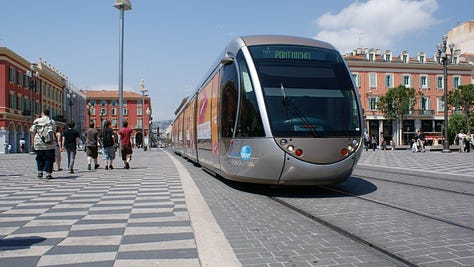
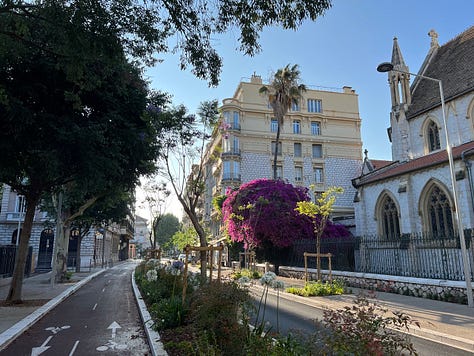
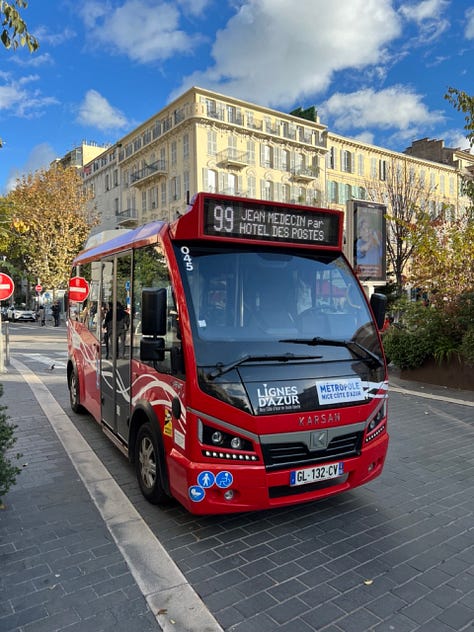
Convenience, to us, implies good public transportation. While living in Ireland we had given up car ownership in favour of public transport, cycling, or hiring a car for excursions outside of the Dublin area. Since we had no desire to take on car ownership again, having excellent public transportation was a must—and Nice certainly delivers on that count. Since our first visit here a two new tramways, one connecting the airport to Nice Port, have been completed and come into use; two more are under construction. There is also an aggressive programme to reduce traffic in the city centre by converting bidirectional roadways into one-way streets with cycle paths with new greenery. The bus system is clean and reliable. And we can use all these services with a single transportation pass—available to séniors in 2025 for €180 annually.
We appreciate the superb public transportation and love cycling, but we also enjoy walking, and Nice is a very walkable city. We wished for amenities close to a new home—a market, grocery stores, restaurants, and other common services. Having lived in Dublin with the Irish Sea never more than ten minutes away by foot, giving up proximity to the sea was hard to contemplate. Nice, with its Baie des Anges, its accompanying Promenade des Anglais, Port and coastal walk, so close to the city centre, ticked this box.
We also appreciate that the City of Nice has an ongoing programme of dramatically expanding green spaces within he city, providing some level of both cooling and reduction of carbon-dioxide. Prominent among the projects is the expansion of the Promenade du Paillon, a parkland built upon the covered Paillon River that flows through central Nice, creating a coulée verte, or “green river path,” extending the existing parkland by a kilometre, covering eight hectares. Plans include creation of an “urban forest” by planting 1,500 trees and thousands of other plants.1
What about services for seniors? France is a country with an ageing population, with 21.5 percent of its population at age 65 or older in 2024.2 Nice has a reputation as a retirement destination, and in 2021 some 24 percent of the population were 65 or older.3 The City of Nice supports a range of services benefitting seniors (defined locally as anyone 55 or older)—events and activities, programmes for health and well-being, and specialised services for those in need of assistance.4 The latter include meal delivery programmes, household assistance, retirement housing and nursing care. Information about such services is available at the Office Municipal Niçois des Séniors as well its network of five Maisons des Séniors distributed throughout the city.5
A recent mailing from the Office of the Mayor notes that its actions on behalf of its seniors has earned it “gold label” status by the “Villes Amies des Aînés,” an association whose mission is to encourage cities “to better adapt to the needs of seniors, in order to support the potential that seniors represent for humanity.” The communication notes that the recognition confirms Nice’s “place among French cities where life is good for seniors. [It is] one of the three most welcoming cities in France, according to a recent ranking.”
It is worth noting that French culture generally respects its older citizens, which is reflected in the quality of municipal services available to them. Intergenerational friendships are also common, and indeed the City of Nice fosters them with events and programmes—matching students with tutors, encouraging housing arrangements that bring together seniors and university students, facilitating free attendance at selected university courses for seniors, etc.
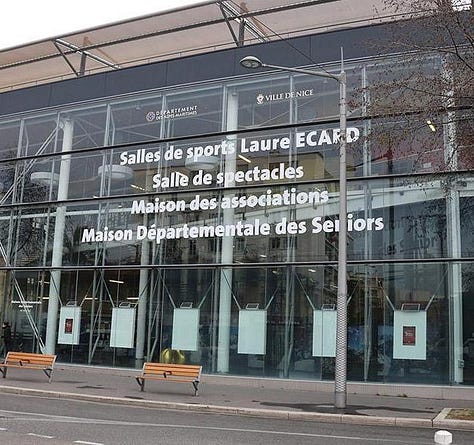
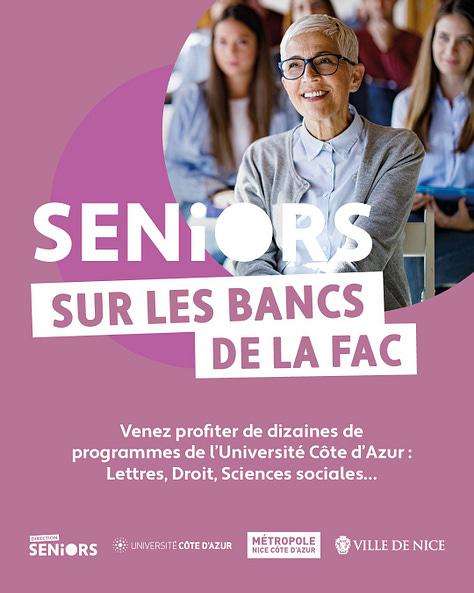
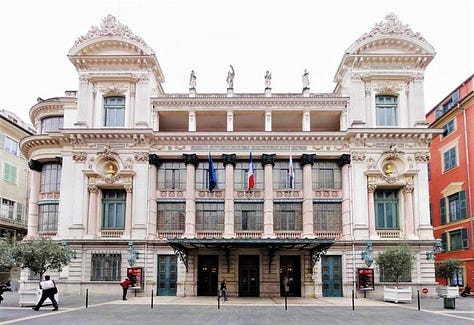
I’d be remiss if I did not mention also that Nice has a welcome programme for all new residents, regardless of age, aptly named “Les nouveaux Niçois.”6 Once registered, the City alerts newcomers to activities that orient them to the city and the region. These include: an annual fair to introduce new residents to city services; and a monthly set of visits to offices and locations that provide municipal services or which represent sites of cultural interest—ranging from the archives’ conservation laboratory and the city’s Niçois kitchen, to an ancient olive oil mill and the Bellet vineyards that so enchanted Thomas Jefferson on his visit to the city in 1787.7
With regard to the arts, Nice has a splendid range of cultural institutions, both municipal and private. Those supported by the city include museums, the Théâtre National, Opéra, Ballet, Orchestre Philharmonique, and more. The public museum facilities are accessible without charge to all Nice residents with the Pass Musées de Nice. Sure, these resources are much more modest that what one finds in Vienna or Rome, for example. But the excellent French transportation systems also assure easy access to other major cultural centres—Paris and Milan are five hours by train, and most European capitals can be reached within two hours by air.
Apart from the general benefits provided by the city and its environment, we had an additional set of requirements determined by personal preferences—lifestyle concerns, one might say. My wife and I are both musicians and play impractically large instruments. We have a very heavy seven-foot grand piano (500kg or 1,100 lbs; compare to a nine-foot Steinway D at 483 kg), and my instrument is double bass. The piano alone put some constraints on our housing choices. For practical purposes we wanted an apartment on the first floor (meaning second floor if you think in American terms); otherwise we’d need to find a building with tall windows through which a crane could lift the piano. A scary proposition. We also did not want to be restrained in playing the instruments—having some separation from other building residents was desirable as well.
Indeed within two weeks of arriving in Nice we found a nearly ideal residence. It is a large first-floor apartment in a lovely belle époque building with a lift (another requirement) and a wide iron-framed staircase that can accommodate bringing the piano into the apartment. Below us is a business, and the flat above us is occupied by offices (with very quiet employees).
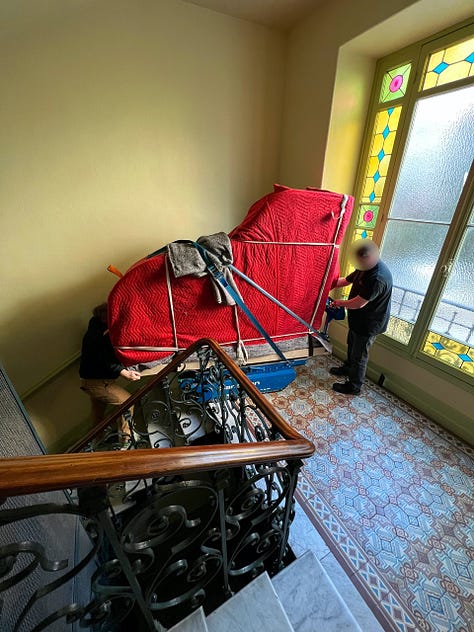
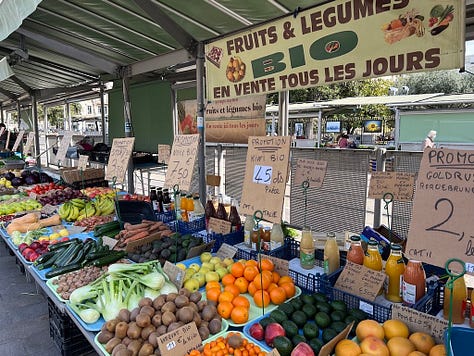
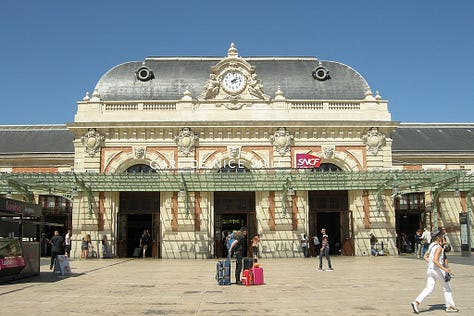
The apartment’s location also fits well into our list of requirements. You’ve heard the concept of the “fifteen minute city”?8 The placement of our new abode is practically a case study. Within 400 metres there are three grocery stores, nearly a dozen restaurants, five bakeries, five butchers (including one kosher and one halal), and many other petits commerces (small businesses). Our médecin généraliste (GP), dentist and eye doctor are minutes away, as are at least a dozen medical laboratories and pharmacies. We can walk to the major city market (the Marché de la Libération) in fifteen minutes or to the Mediterranean Sea in twenty. The train station is five minutes by bus, the airport forty minutes by tram. We can board a bus in Nice and be in in Italy in just thirty-five minutes.
There are other considerations, too, under the general rubric of “quality of life”—excellent clinics and hospitals, climate (mild, though with two very warm summer months over the past two years), affordable cost of living (comparatively high by French standards, especially for housing—but less so when viewed from an American or Irish perspective).
At the time our retirement dates came into focus, however, it was not obvious that this would be our ultimate destination. We knew Paris well; I had also spent a lot of time in Strasbourg in the 1970s and 1980s. We already knew Nice from several prior visits, but we wanted to experience more of the country before making a decision. We undertook a stay in Bordeaux in 2018 and enjoyed the city but left with some concerns; neither of us thought it would ever feel like home. The following year we spent time in Brittany, visiting Rennes (which we loved) and Saint Malo (on a holiday weekend when it was mobbed with Parisians). But then the pandemic intervened. A trip to Aix-en-Provence in April 2020 fell victim to the travel ban which came into place in late March of that year, and a visit to Nantes and coastal Brittany had to be cancelled as well.
We moved in December 2021, taking the month as a holiday in our last year of employment. With our apartment coming available in January 2022, we became permanently resident in France at that time.
Has our choice of retirement destination lived up to expectations? Yes, indeed. We find the culture of Nice to be relaxed and very welcoming, and appreciate in particular the amenities and cultural diversity of our own neighbourhood. We love the proximity of the sea and the long walks and bicycle rides we take along the Promenade and elsewhere. And we really do not miss Massachusetts or Dublin winters.
While I’ve emphasised practical concerns in choosing our place of residence, those considerations are not only about finding a pleasurable life. Together they reflect our values and expectations of an environment where government intends, within the bounds of human frailty, to actively serve its people. Where there is public investment in the health of the nation and in the amenities that allow the state and its people to flourish—such as effective transportation systems, and commitment to fairness in commerce. And, though newcomers, we embrace the concepts of liberté, égalité, fraternité, et laïcité, just as we do the ideal of liberty and justice for all.
Do we have any worries or concerns? Yes, of course, anyone paying attention to French political and economic news would harbour some concerns. With a share of retirement income sourced from the US, we have concerns there as well. Climate change is tangible and moving quickly; there is no reason to our area will be spared from increasing heatwaves and droughts (and the Niçois back-country has also suffered significantly from flooding).9 Our calculus is, however, that for us and this time, the choice is the right one, and we are very happy.
Any more questions about why we chose Nice?
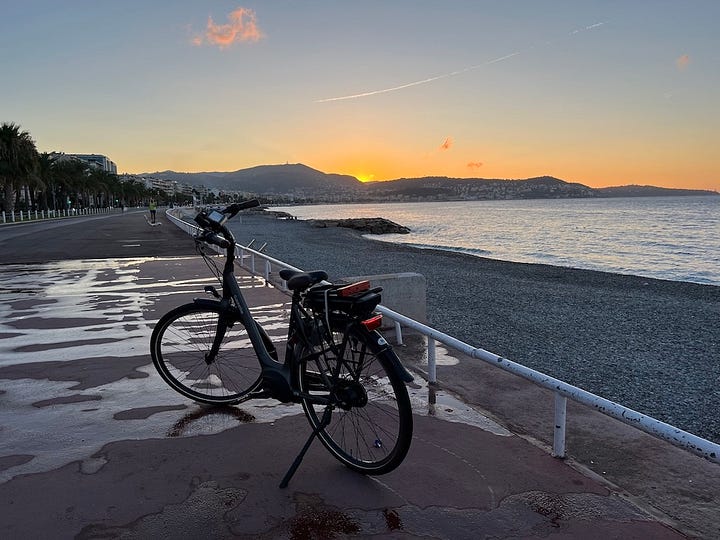
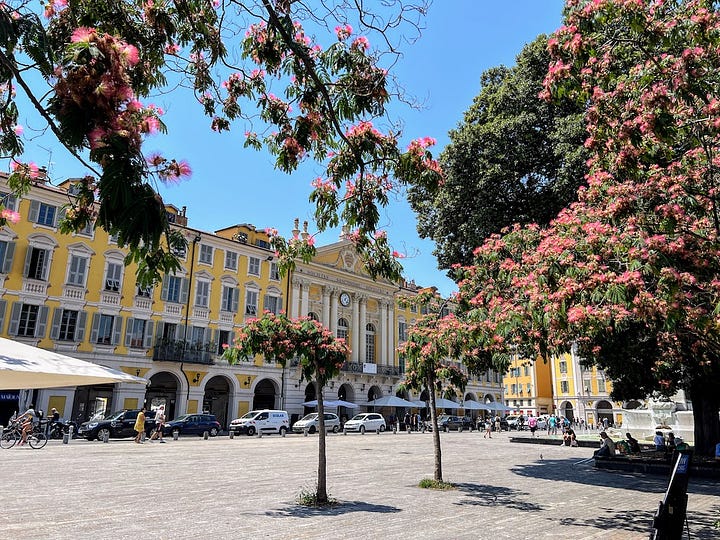
Details of this and related projects can be found here: https://www.nice.fr/fr/actualites/la-ville-de-nice-se-revegetalise/mairie?type=articles (consulted 5 December 2024)
“Distribution of the population in France as of January 1, 2024, by age group,” Statista https://www.statista.com/statistics/464032/distribution-population-age-group-france/ (consulted 3 December 2024)
“Nice (Nice, Alpes-Maritimes, France) - Population Statistics,” City Population https://www.citypopulation.de/en/france/alpesmaritimes/nice/06088__nice/ (consulted 4 December 2024)
The City of Nice’s programme for seniors is described in its brochure: Ville de Nice, “Le Guide des Séniors Nice” (https://www.nice.fr/uploads/media/default/0001/21/Guide_des_seniors_NIce_2019.PDF (consulted 4 December 2024)
Vile de Nice, “Le réseau des Maisons des Seniors” https://www.nice.fr/fr/activites-et-loisirs/le-reseau-des-maisons-des-seniors (Consulted 4 December 2024)
See “L'accueil des Nouveaux Niçois,” Ville de Nice https://www.nice.fr/fr/nouveaux-nicois (consulted 12 December 2024).
Sébastien Lapaque, “Bellet, le plus élégant de tous les vins du monde,” Le Figaro (27 July 2022) https://www.lefigaro.fr/gastronomie/bellet-le-plus-elegant-de-tous-les-vins-du-monde-20220727 (consulted 12 December 2024)
See the overview of the concept and its various manifestations in “15-minute city,” Wikipedia https://en.wikipedia.org/wiki/15-minute_city#cite_note-Weng_2019-4 (consulted 2 December 2024).
See Keith Christiansen’s thoughtful commentary on climate change, planning and personal choices, “Finding Home in a Changing World: sustainability, water, and governance matter a lot more than just picking where to live,” Finding Home Elsewhere (4 December 2024) https://substack.com/inbox/post/152563401 (consulted 4 December 2024).

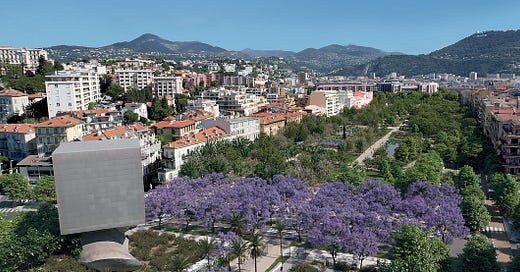



Ah, well, I can't compare Nice to other major French cities with regard to museums since I really only know Paris and Strasbourg well, with brief visits elsewhere.
There is, indeed, a good variety of small museums here. The Musée des Beaux Arts is lovely and has interesting if limited collections; the building is in desperate need of refurbishment (the current Raoul Dufy exhibition is wonderful). We regularly visit several others; the Chagall Museum we never tire of and sometimes go just to enjoy lunch at the Buvette, nestled into the old olive grove on the grounds. I have an essay in progress about L'Artistique, perhaps the least well known of the Nice museums; we are invariably the only visitors when we attend (though it attracts good crowds for public lectures). The only museum I don't care for is the rather sterile Museum of Modern Art, which at any rate is currently closed for renovations.
The City of Nice will not find a better booster than you sir. All the authorities need to do is point a new comer to your post and watch as the tourist turns into a resident...puff. Truly enjoy reading your posts.